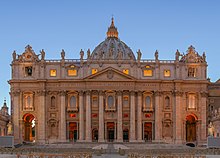
Back ماريولوجيا كاثوليكية Arabic Mariologia catòlica Catalan Katolická mariologie Czech Romkatolika Mariologio Esperanto Dogmas y doctrinas marianas de la Iglesia católica Spanish Katolikus mariológia Hungarian Mariologi Katolik ID Dogmas e doutrinas marianas da Igreja Católica Portuguese Mariolojia ya Kikatoliki Swahili உரோமன் கத்தோலிக்க மரியாளியல் Tamil

| Part of a series on the |
| Mariology of the Catholic Church |
|---|
 |
|
|
| Part of a series on the |
| Catholic Church |
|---|
 |
| Overview |
|
|
Catholic Mariology is Mariology (the systematic study of the person of Mary, mother of Jesus, and of her place in the Economy of Salvation[1][2][3]) in Catholic theology. According to the Immaculate Conception taught by the Catholic Church, she was conceived and born without sin, hence Mary is seen as having a singular dignity above the saints, receiving a higher level of veneration than all angelic spirits and blessed souls in heaven. Catholic Mariology thus studies not only her life but also the veneration of her in daily life, prayer, hymns, art, music, and architecture in modern and ancient Christianity throughout the ages.[4][5][6][7]
The four Marian dogmas of Mother of God, Immaculate Conception, perpetual virginity, and Assumption form the basis of Mariology. However, a number of other Catholic doctrines about the Virgin Mary have been developed by reference to sacred scripture, theological reasoning and church tradition. The development of Mariology is ongoing and since the beginnings it has continued to be shaped by theological analyses, writings of saints, and papal statements, e.g. while two of the dogmas are ancient, the other two were defined in the 19th and 20th centuries; and papal teachings on Mary have continued to appear in recent times.[8][9][10]
In parallel to the traditional views, since the late 19th century, as Marian devotion became more pronounced in the Catholic Church, a number of other perspectives have been presented as a challenge to Catholic Mariology. Other Christian views see Catholic Mariology as unbiblical and a denial of the uniqueness of Christ as redeemer and mediator,[11] and modern psychological interpretations see Mary as similar to mythical goddesses ranging from Diana to Guan Yin.[12][13][14] Nonetheless, most Christians including the Latin Church led by the pope, the Eastern Orthodox Church, the Oriental Orthodox Church, and the Church of the East revere Mary as the greatest saint and disregard Protestant objections to Marian devotion.
- ^ The Oxford Dictionary of the Christian Church ISBN 978-0-19-280290-3 (2005) defines Mariology as "the systematic study of the person of the Blessed Virgin Mary and of her place in the economy of the Incarnation"
- ^ Our Sunday Visitor's Catholic Encyclopedia (ISBN 978-0-87973-669-9 page 649) defines Mariology as "The study of the Blessed Virgin Mary in Christian theology, especially in the Catholic Church"
- ^ Our Sunday Visitor's Encyclopedia of Saints ISBN 978-1-931709-75-0 page 917 defines Mariology as "Branch of theology that focuses on the Blessed Virgin. It examines her life, virtues, and important role in the economy of salvation."
- ^ Merriam-Webster's Encyclopedia of World Religions by Wendy Doniger, 1999 ISBN 0-87779-044-2 page 696
- ^ Symbolic Scores: Studies in the Music of the Renaissance by Willem Elders 1997 ISBN 90-04-09970-0 page 151
- ^ Maiden and Mother: Prayers, Hymns, Devotions, and Songs to the Beloved Virgin Mary Throughout the Year by Margaret M. Miles 2001 ISBN 0-86012-305-7 page vii
- ^ Cite error: The named reference
Bulman179was invoked but never defined (see the help page). - ^ Mary in the New Testament by Raymond E. Brown 1978 ISBN 0-8091-2168-9 page 28, "in the course of centuries, Mariology has had an enormous development"
- ^ Luigi Gambro in Mariology: A Guide for Priests, Deacons, Seminarians, and Consecrated Persons ISBN 1-57918-355-7, 2008 edited by M. Miravalle, pages 142-145
- ^ Trent Pomplun in The Blackwell Companion to Catholicism by James Buckley, Frederick Christian Bauerschmidt and Trent Pomplun (Dec 21, 2010) ISBN 1-4443-3732-7 pages 319-320
- ^ Cite error: The named reference
edwards438was invoked but never defined (see the help page). - ^ Cite error: The named reference
JillLevinewas invoked but never defined (see the help page). - ^ Cite error: The named reference
Vitzwas invoked but never defined (see the help page). - ^ Encyclopedia of Psychology and Religion: L - Z by David Adams Leeming 2009 ISBN 0-387-71801-X page 900
© MMXXIII Rich X Search. We shall prevail. All rights reserved. Rich X Search